My first 18 years
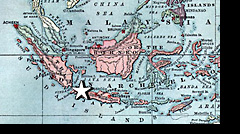 I was born 1938 in Serang, Java, the Dutch East Indies—now known as Indonesia. My mother was born in Vienna, Austria; my father in Friesland, the Netherlands. He was principal of the Dutch elementary school in Serang.
I was born 1938 in Serang, Java, the Dutch East Indies—now known as Indonesia. My mother was born in Vienna, Austria; my father in Friesland, the Netherlands. He was principal of the Dutch elementary school in Serang.
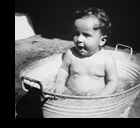 When World War II broke out, the Japanese invaded Dutch Java. My father was deported to Japan as a prisoner of war. Mother, my brother and I were taken to Batavia (Jakarta). We spent three years in concentration camps. The memories I retained are few but vivid; like color slides embedded in the gray cells of my brain.
When World War II broke out, the Japanese invaded Dutch Java. My father was deported to Japan as a prisoner of war. Mother, my brother and I were taken to Batavia (Jakarta). We spent three years in concentration camps. The memories I retained are few but vivid; like color slides embedded in the gray cells of my brain.
Each camp was part of the city and was encircled by two tall bamboo fences with a thirty-foot area, like a moat, for patrolling. Our biggest thrill was dashing to the outer wall, touch it, and then run back to safety without being seen by the soldiers. Some of us kids got caught and we were scolded by the women.
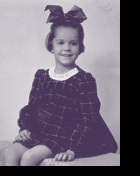 There was no school—no books, papers, crayons, nor toys. We entertained ourselves because our mothers worked; either in the rice paddies; cleaning outhouses (no flush toilets); cooking, or doing laundry for the soldiers. Our daily routine: rope-jumping; hop-scotch, and a fun game called cat’s-cradle. Mother had made me a rag doll.
There was no school—no books, papers, crayons, nor toys. We entertained ourselves because our mothers worked; either in the rice paddies; cleaning outhouses (no flush toilets); cooking, or doing laundry for the soldiers. Our daily routine: rope-jumping; hop-scotch, and a fun game called cat’s-cradle. Mother had made me a rag doll.
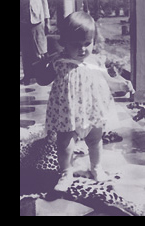 Food was distributed by carts going around ringing a bell, announcing chow time. There was no calendar.
Food was distributed by carts going around ringing a bell, announcing chow time. There was no calendar.
We were transported from camp to camp in open trucks, standing room only. I still hear the women grumble: "Like cattle." I had no idea what cattle was. In the camp we had no dogs and cats (they had been eaten). We had birds, lizards, snakes, worms, and insects.
Women were anxious to know what was going on in the world and tried digging tunnels underneath "the moat" to reach the world outside. To prevent this, we had unexpected roll-calls where everyone had to leave their house and line up on the streets. When the soldiers came, we had to bow deep. Then they would enter the houses and look for signs of digging. One day they found a tunnel and demanded that the women surrender. Mother told me that 50 women decided to do so. The commander of the camp had the women shave their heads. The next day he looked for them but there were none. He ordered them to appear. Fifty women stepped forward and removed their "turbans" on which they had sewn their shaven locks. Mother told me the commander laughed.
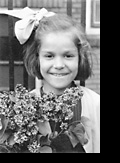 In one camp I saw strange-looking children. One kid had a huge head, large blue eyes and curly blond hair; he had "water" inside his head, I was told. There were Down-syndrome children and paralyzed ones in wheelchairs. These children soon departed.
In one camp I saw strange-looking children. One kid had a huge head, large blue eyes and curly blond hair; he had "water" inside his head, I was told. There were Down-syndrome children and paralyzed ones in wheelchairs. These children soon departed.
Every time we moved we had a body search before embarking on the trucks. Mother had made from green material leaves in which she had sewn gold coins. She would give me a bunch of flowers to carry and added her leaves. She had put jewelry inside my rag doll. In the last camp we slept on the floor on mattresses, like sardines in a tin, it was that crowded.
One day a siren went off. Everyone rushed to the main gate. British soldiers saluted us. Mother shouted: "We are free! We are saved!" It was August, 1945. A month later we received news that Papa had died. On the way to Japan, his ship had been torpedoed; he had swum ashore in Sumatra where he died of dysentery in a camp.
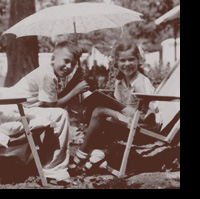 Mother was now a widow and we were half-orphaned. Mercifully, Mother received a state pension because Papa had been in the civil service. But private entrepreneurs, like plantation owners, were destitute, not only having lost their property but bank accounts had also been emptied by the Japanese. Mother went to Serang; the house had been ransacked and the flower-beds overturned; servants had been looking for hidden treasure.
Mother was now a widow and we were half-orphaned. Mercifully, Mother received a state pension because Papa had been in the civil service. But private entrepreneurs, like plantation owners, were destitute, not only having lost their property but bank accounts had also been emptied by the Japanese. Mother went to Serang; the house had been ransacked and the flower-beds overturned; servants had been looking for hidden treasure.
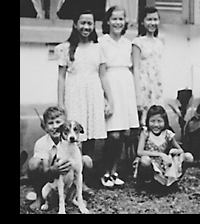 Then Mother received notice that we were to leave on the SS Nieuw Amsterdam for the Netherlands in December. A kind family took us in for the time being. Across the street was a house with another family (two years later their son became our step-father).
Then Mother received notice that we were to leave on the SS Nieuw Amsterdam for the Netherlands in December. A kind family took us in for the time being. Across the street was a house with another family (two years later their son became our step-father).
Late December, we embarked on the SS Nieuw Amterdam; women and children only. The ship had been refurbished for troops and we slept in triple bunk-beds; Mother the top one, I the middle, and my brother the bottom. Sometime during the trip an epidemic broke out: measles, mumps, and whooping-cough. I contracted all three and was moved to the ship’s hospital. I was put up in a hammock. Cool!
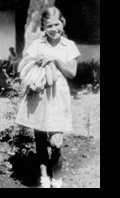 We arrived January, 1946, in Amsterdam. I remember being taken on a stretcher covered with one thin blanket on shore. There I waited, with other kids on stretchers, for hours until we were taken to a hospital; the nightmare of my life. Mother had to search for me everywhere. I owe much to the invention of penicillin; I had also contracted pneumonia. Doctors told Mother to arrange my funeral; she begged my father’s family in Friesland to take me in, a sister had married a dairy farmer. And thanks to the Red Cross, their car drove us all the way to Friesland. A brother of my father was a veterinarian and he took care of me. Mother had to return to Amsterdam to look after my brother; they were staying with strangers in rooms the government had provided for us in a large canal house. Mother visited me whenever possible. Trains and buses were not going to Friesland on a regular basis.
We arrived January, 1946, in Amsterdam. I remember being taken on a stretcher covered with one thin blanket on shore. There I waited, with other kids on stretchers, for hours until we were taken to a hospital; the nightmare of my life. Mother had to search for me everywhere. I owe much to the invention of penicillin; I had also contracted pneumonia. Doctors told Mother to arrange my funeral; she begged my father’s family in Friesland to take me in, a sister had married a dairy farmer. And thanks to the Red Cross, their car drove us all the way to Friesland. A brother of my father was a veterinarian and he took care of me. Mother had to return to Amsterdam to look after my brother; they were staying with strangers in rooms the government had provided for us in a large canal house. Mother visited me whenever possible. Trains and buses were not going to Friesland on a regular basis.
September, 1946, I moved in with Mother and my brother; we had been given rooms in a house in Voorburg, a suburb of The Hague. I was eight years old when I went to SCHOOL for the first time! I was so excited! Sitting on the school bench, I learned to write the ABCs on a "slate." Within a year, I managed two grades and in September, 1947, I started third grade elementary.
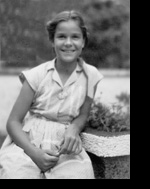 Summer of 1948 we took the train from Holland to Vienna, Austria, to meet our grandparents and my mother’s sister and her husband. Our paternal grandparents had died in the war. And in September Mother married by proxy the man she had met in Batavia (Jakarta). December, 1948, we boarded a ship at Rotterdam and returned to Java; this time to a town called Banjuwangi, a port-of-call for freighters, across from famous Bali.
Summer of 1948 we took the train from Holland to Vienna, Austria, to meet our grandparents and my mother’s sister and her husband. Our paternal grandparents had died in the war. And in September Mother married by proxy the man she had met in Batavia (Jakarta). December, 1948, we boarded a ship at Rotterdam and returned to Java; this time to a town called Banjuwangi, a port-of-call for freighters, across from famous Bali.
The next 18 months were idyllic. We went to school in a horse-drawn carriage, our taxi. And when the monsoon rains arrived, the chauffeur took us. My 4th-grade class was small, only 5 pupils: A Dutch boy, me, a Chinese girl, our neighbor, and 2 native boys. Weekends we spent on plantations, picnics on wide open beaches, and vacations in Bali. Then we heard the tragic news that the Dutch school would close. Summer, 1950, we had to leave for Europe.
From Jakarta we flew by KLM to Karachi where we had an overnight stay in a hotel (nightmarish experience) and the next day we continued to Amsterdam. Relatives of our new Papa took us in. My brother then went to a boarding school and I flew to Vienna to stay with my godparents, my mother’s sister and her husband. I didn’t speak a word of German.
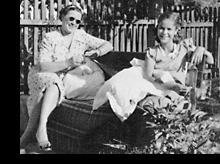 The day after my arrival I was whisked to a hospital to greet my grandfather, who was dying of cancer. I had not been told of this by my mother. The next day grandfather died. The dressmaker made me a pleated black silk skirt and short-sleeved blouse; I remember it so well! The experience of a funeral—I was weeping at the grave, feeling so lonely, unable to communicate, nobody spoke Dutch. After the funeral my aunt took me on vacation to Attersee in the Salzkammergut. I have the fondest memories of this place. I met two brothers who taught me basic German; including dirty words. Kids are kids! For a long time I kept contact with the older boy; who proposed marriage—first sweetheart? In the meantime my uncle had been searching for a school. He had not been informed that I was to enter 6th grade elementary and so he registered me at the high school "around the corner," two blocks away. He engaged a tutor, who spent afternoons doing homework with me. My aunt, a semi-retired opera singer, had a busy social schedule and uncle was involved with his business. He was a bibliophile and every week gave me a book. I thank him for this because I don’t think that I would have thought of writing books myself.
The day after my arrival I was whisked to a hospital to greet my grandfather, who was dying of cancer. I had not been told of this by my mother. The next day grandfather died. The dressmaker made me a pleated black silk skirt and short-sleeved blouse; I remember it so well! The experience of a funeral—I was weeping at the grave, feeling so lonely, unable to communicate, nobody spoke Dutch. After the funeral my aunt took me on vacation to Attersee in the Salzkammergut. I have the fondest memories of this place. I met two brothers who taught me basic German; including dirty words. Kids are kids! For a long time I kept contact with the older boy; who proposed marriage—first sweetheart? In the meantime my uncle had been searching for a school. He had not been informed that I was to enter 6th grade elementary and so he registered me at the high school "around the corner," two blocks away. He engaged a tutor, who spent afternoons doing homework with me. My aunt, a semi-retired opera singer, had a busy social schedule and uncle was involved with his business. He was a bibliophile and every week gave me a book. I thank him for this because I don’t think that I would have thought of writing books myself.
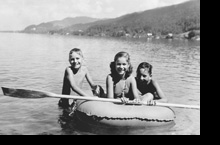 Saturdays, they dropped me off at my grandmother, aged 77. We played canasta a lot; I let her win so she would buy me my favorite candy. Sundays, aunt and uncle would fetch us and we would attend several churches; first the Greek Orthodox, my grandfather’s religion, then the Lutheran church in Center City, and on occasion to a Roman Catholic church where my aunt sang with the choir. Then we had lunch at a restaurant outside Vienna. We returned to my grandmother’s apartment for her famous "Apfelstrudl" with whipped cream. These weekends were a ritual.
Saturdays, they dropped me off at my grandmother, aged 77. We played canasta a lot; I let her win so she would buy me my favorite candy. Sundays, aunt and uncle would fetch us and we would attend several churches; first the Greek Orthodox, my grandfather’s religion, then the Lutheran church in Center City, and on occasion to a Roman Catholic church where my aunt sang with the choir. Then we had lunch at a restaurant outside Vienna. We returned to my grandmother’s apartment for her famous "Apfelstrudl" with whipped cream. These weekends were a ritual.
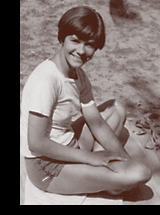 After a year in Vienna, I was complaining in my letters home that I felt "neglected" because auntie was very busy. One bright day we received news that Mother would come to Vienna and take me to Holland.
After a year in Vienna, I was complaining in my letters home that I felt "neglected" because auntie was very busy. One bright day we received news that Mother would come to Vienna and take me to Holland.
It was January, 1952, when Mother took me and my brother to a family in Oosterbeek, near Arnhem; our foster family had been recommended by the Rotary Club of Holland; relatives of "Papa" were members. I went to school in Arnhem at the well-known all-girls high school dubbed "The Aquarium" by the boys from the all-boys high school next door. I sat at the desk inscribed "Audrey" (Hepburn!). I had difficulty with the curriculum; very different from the one in Vienna. I never had French, taught already in elementary school, so I had a tutor. My German was excellent and my English was good thanks to an American teacher in Vienna. My knowledge of Dutch history and geography was zero. On top of my scholastic difficulties, I had trouble with my foster mother. Again, I complained in letters home. Then an episode occurred and foster mother locked me up for three days, notifying my school that I was sick. I escaped by tying bed sheets and, like Rapunzel, I let myself down the balcony. I bicycled to my best friend in Arnhem where I told what had really happened. Needless to say, the principal got involved.
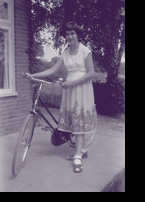 My brother and I were "deported" to The Hague. The relatives found a home for my brother and also for me. It was spring, 1953. My foster parents were retired teachers and found me a place at a private high school. I had a great time in The Hague and made friends with fellow students; with one I’m still in contact.
My brother and I were "deported" to The Hague. The relatives found a home for my brother and also for me. It was spring, 1953. My foster parents were retired teachers and found me a place at a private high school. I had a great time in The Hague and made friends with fellow students; with one I’m still in contact.
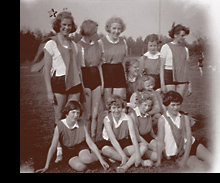 Telephone communications in the 1950s with Indonesia were practically non-existent because few private individuals had a telephone. Once we were shuttled to Hilversum, near Utrecht. Radio Hilversum broadcasted regularly "voice-mail" between children and their parents overseas. This was the only opportunity for parents to hear their children. (How times have changed!)
Telephone communications in the 1950s with Indonesia were practically non-existent because few private individuals had a telephone. Once we were shuttled to Hilversum, near Utrecht. Radio Hilversum broadcasted regularly "voice-mail" between children and their parents overseas. This was the only opportunity for parents to hear their children. (How times have changed!)
June, 1954, my parents came to Holland for a six-month vacation and we met our two-year-old sister. They rented a small, furnished bungalow. We stayed with our respective foster parents. Papa bought a car and we took trips abroad, to Germany, Belgium, and, of course, to Vienna to visit the family.
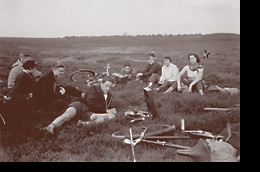 Then the news came that Papa’s work-permit had not been renewed. He contacted friends in Bali and they sold his properties and via Singapore the funds were transmitted. With the money, Papa bought a condo in The Hague. He got a job in Rotterdam and commuted by car. But Mother was unhappy in rainy Holland. Friends had immigrated to the US and wrote enthusiastic letters about their wonderful life in America. Well, via connections, Papa was able to secure employment in Philadelphia.
Then the news came that Papa’s work-permit had not been renewed. He contacted friends in Bali and they sold his properties and via Singapore the funds were transmitted. With the money, Papa bought a condo in The Hague. He got a job in Rotterdam and commuted by car. But Mother was unhappy in rainy Holland. Friends had immigrated to the US and wrote enthusiastic letters about their wonderful life in America. Well, via connections, Papa was able to secure employment in Philadelphia.
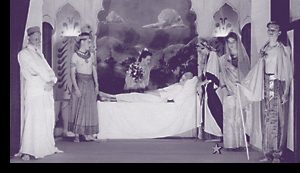
In The Letter from the King by Rabindranath Tagore
And so my parents sold their condo, the car and furniture. I could have stayed in The Hague with foster parents. I had been enrolled at a small college studying to become a "dietician." But I was determined not to be left behind. We boarded the SS Maasdam at Rotterdam in February, 1957.
on to page 2, Coming to America >>
